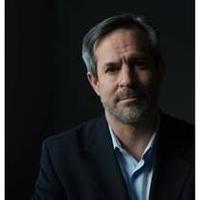Jonathan Weisman
Goodreads Author
Born
in Salt Lake City, The United States
Website
Twitter
Genre
Member Since
March 2015
URL
https://www.goodreads.com/goodreadscomJonathan_Weisman
To ask
Jonathan Weisman
questions,
please sign up.
Popular Answered Questions

|
(((Semitism))): Being Jewish in America in the Age of Trump
—
published
2018
—
3 editions
|
|

|
No. 4 Imperial Lane
—
published
2015
—
6 editions
|
|
* Note: these are all the books on Goodreads for this author. To add more, click here.
Jonathan’s Recent Updates
|
Jonathan Weisman
is now friends with
ArtistLike
|
|
“In late March 2016, at a very bad Thai restaurant in the little town of Selfoss, Iceland, I and my daughters Alissa and Hannah sat with my girlfriend, Jennifer, and her daughters Sadie and Hannah (yes, two Hannahs) as Jennifer and I pressed forward with the difficult task of family blending. Jennifer's Hannah was talking about Black Lives Matter and the injustices that befall African Americans every day.
'Anti-Semitism basically doesn't exist in the United States,' she asserted.
I shocked myself with my response. I recoiled at her words and argued passionately that Jews must never think that anti-Semitism has been eradicated. Vigilance, I preached. The Jew can never be at peace.
I sounded like my grandmother.”
― (((Semitism))): Being Jewish in America in the Age of Trump
'Anti-Semitism basically doesn't exist in the United States,' she asserted.
I shocked myself with my response. I recoiled at her words and argued passionately that Jews must never think that anti-Semitism has been eradicated. Vigilance, I preached. The Jew can never be at peace.
I sounded like my grandmother.”
― (((Semitism))): Being Jewish in America in the Age of Trump
“Until the rise of Trumpism, Judaism was easy, not just for me but for millions of American Jews. It was cafeteria-style: observe or don't, join a synagogue or attend the occasional Jewish film festival, read Philip Roth, eat bagels and babka, say 'oy' ironically. You could be Jewish by religion, Jewish by culture, Jewish by birth or identity - take your pick. In October 2013, the Pew Research Center asked the American Jewish community what it meant to be Jewish. The answers said a lot: 73 percent, the largest category, said remembering the Holocaust, followed by another category that was even more nebulous, who said leading a moral or ethical life. Then there were the 56 percent who said that being a Jew meant working for justice and equality, the 49 percent who said it meant being intellectually curious, the 43 percent who said it meant caring about Israel, separated by a statistically insignificant gap from the 42 percent who said it meant having a good sense of humor. Second from the bottom, at 19 percent, was observing Jewish law, followed only by eating traditional Jewish food.
Oy.”
― (((Semitism))): Being Jewish in America in the Age of Trump
Oy.”
― (((Semitism))): Being Jewish in America in the Age of Trump
“Jews have grown so obsessed with Israel that the overt and covert signals of anti-Semitism beamed from the interior of the Trump campaign appeared to be disregarded by people like Adelson and Bernie Marcus, the Home Depot co-founder and Republican mega-donor who seemed wowed by candidate Trump’s solemn promise to immediately move the U.S. embassy from Tel Aviv to Jerusalem and to back Likud’s expansive settlement policy on the West Bank. Never mind that both moves were purely symbolic: Netanyahu was going to do what he was going to do regardless of Washington’s feckless policies or the location of its ambassador. What mattered was Israel, pure and simple. It was something of a comeuppance when President Trump immediately backed off his promise of an embassy move, swiftly sent a letter to Prime Minister Netanyahu scolding him on settlements, and promised a new push for Israeli-Palestinian peace talks. But beyond leaked word that Adelson was really, really, really angry, no apologies or mea culpas were forthcoming from American Jewry. Trump did make Israel a stop on his first trip abroad—the earliest visit to the Jewish state by any American president. But before his arrival, his White House made no comment on the two Israeli-American journalists who were denied visas to follow the president into Saudi Arabia, where he happily danced with swords and his commerce secretary boasted that there had been no protestors. Once he had landed in Jerusalem, Trump did note that he “just got back from the Middle East,” a moment memorialized by Ron Dermer, Israel’s ambassador to the United States, covering his face with his hand in frustration or amazement. Trump scheduled all of fifteen minutes for a stop at Yad Vashem, Israel’s revered Holocaust memorial and museum, and in his brief remarks there—from 1:27 to 1:34 p.m.—he managed both to extol the Jewish people and let slip his cherished stereotypes: “Through persecution, oppression, death, and destruction, the Jewish people have persevered. They have thrived. They’ve become so successful in so many places.” Ever solicitous, Netanyahu thanked the president, who “in so few words said so much.” No one took note of the irony that the Holocaust survivor who greeted Trump, Margot Herschenbaum, had been rescued in 1939 by the Kindertransport, which had whisked her out of Germany and had saved thousands of other Jewish children. Refugees like Herschenbaum had been denied entry to the United States during World War II, just as Trump has steadfastly denied the entry of Syrian children fleeing war and death in their own country.”
― (((Semitism))): Being Jewish in America in the Age of Trump
― (((Semitism))): Being Jewish in America in the Age of Trump
Comments (showing 1-5)
post a comment »
date newest »
newest »
 newest »
newest »
 My new book (((Semitism))): Being Jewish in America in the Age of Trump is ready for pre-order. The reviews are coming in strong. Publication coming March. 20. Please take a look.
My new book (((Semitism))): Being Jewish in America in the Age of Trump is ready for pre-order. The reviews are coming in strong. Publication coming March. 20. Please take a look.http://read.macmillan.com/lp/semitism...
 Publisher's Weekly on (((Semitism)))
Publisher's Weekly on (((Semitism)))https://www.publishersweekly.com/9781...
Weisman (No. 4 Imperial Lane), the New York Times’ deputy Washington editor, offers a chilling look at resurgent anti-Semitism in America in the wake of Donald Trump’s political ascendancy. Despite feeling only minimally connected to his Jewish heritage, Weisman found himself the target of “alt-right” Trump supporters in 2016 after tweeting an excerpt from an editorial about the rise of fascist tendencies in the U.S.; within minutes, he received a response addressed to “(((Weisman))),” punctuation that he learned was “wrapped around Jewish-sounding names on social media” by online harassers. That response was the precursor to a torrent of online hate he received, which shook Weisman out of his complacency and forced him to face the reality of persistent anti-Jewish bias. He provides a thoughtful and deeply personal account of his struggle to understand what was happening. The hostility Weisman encountered was so overwhelming that his daughter sought reassurance that she didn’t “look Jewish,” which she feared would put her at risk of being targeted as well. Despite that close-to-home evidence of the effectiveness of the bigots, Weisman concludes forcefully, leaving readers with the message that the best way for Jewish Americans to resist bigotry is to champion “liberal internationalism in the oldest, least partisan sense of that phrase.” Agent: Rayhane Sanders, Massie & McQuilkin. (Mar.)
 KIRKUS REVIEW of (((Semitism)))
KIRKUS REVIEW of (((Semitism)))https://www.kirkusreviews.com/book-re...
After becoming a victim of unhinged anti-Semitic hatred, trolled and cyberstalked by fringe-right bigots, a journalist delivers his forceful response.
Weisman (No. 4 Imperial Lane, 2015), the deputy Washington editor of the New York Times, once reported on the activities of a neoconservative, journalism that provoked alt-right activists on social media. Under the cover of “free speech,” they openly expressed their prejudice against Jews in general and the author in particular. Certainly, the author notes, anti-Semitism in the U.S. is hardly new. He recalls the lynching of Leo Frank, the bile spewed by Charles Lindbergh, and other examples. Erstwhile good feelings engendered during the civil rights movement eventually collapsed, and Judaism and its adherents became conflated with the State of Israel. Now, anti-Semitism is flourishing in the Trump era, and what was unacceptable once now swims in the mainstream. With reportorial skill, the author brings us up to date on activities of current hate groups and their leaders. The titular meme—three parentheses (“echoes”) around a proper noun—is a dog whistle signaling, for those attuned to it, “Jew.” Today, marchers in Nazi regalia parade, and swastikas and graffiti abound; harassment, trolling, and cyberstalking are essential tools in the alt-right kit. So what can be done? What should American Jews do? Weisman issues a call to arms in defense of truth. We must organize and fight, he urges, using the internet and social media. Jews, the “Other,” must ally with other Others like African-Americans and immigrants. The author also recommends toning down the obsession with Israel and supporting organizations like the Anti-Defamation League and the Southern Poverty Law Center. “The moral response is imperative,” writes Weisman. “Morality can inform tactics.” For now, though, the value of his brief text remains the light he shines on the current state of bigotry.
An urgent and compelling report on the clear and present danger of proto-fascism in the U.S.
 Kirkus Review of No. 4 Imperial Lane
Kirkus Review of No. 4 Imperial Lane"An American college student extends his year abroad in Thatcher-ite England and takes a position assisting a quadriplegic in New York Times reporter Weisman's debut novel. In love and not in any hurry to leave Brighton, David Heller stays after classes end and takes a volunteer placement as caregiver for Hans Bromwell. Hans, son of the late Tory politician Sir Gordon Bromwell, lives with his sister, Elizabeth, and niece, Cristina, and a dwindling collection of family heirlooms. As children, Hans attended the finest schools while Elizabeth, alone at home, learned from a tutor "who knew nothing but Shakespeare." As a very young woman, she escaped on holiday with her cousin, fell for a Portuguese doctor who was charmed by her habit of quoting the Bard incessantly, and married. She and Hans exchanged letters while she traveled to Africa, where her new husband was posted "to win the hearts and minds" of Portugal's colonies as they fought for independence. David finds himself drawn into the siblings' story, and Cristina's, just as his own family is pressuring him to come home. Weisman pulls the Bromwells' story and David's together, creating a cleareyed study of relationships and grief, touching on both personal and societal tragedies without letting the narrative bog down. A tiny quibble is that David explains British English a fair bit: "She…reached over to put on a bathrobe (dressing gown, she'd say)." The novel succeeds as historical fiction portraying Africa's colonial wars in the 1970s and England's social upheaval in the 1980s and as the story of young people facing the world as it is and not as they've hoped it would be. Weisman's prose is clear and evocative with plenty of detail but no unnecessary flourishes. A fresh, enlightening book, complex, emotionally resonant, and readable.”
 My novel, No. 4 Imperial Lane, is available for pre-order on Amazon. Ya'll sign up!
My novel, No. 4 Imperial Lane, is available for pre-order on Amazon. Ya'll sign up!http://www.amazon.com/No-4-Imperial-L...










































